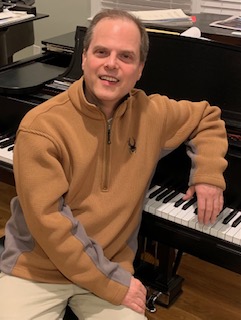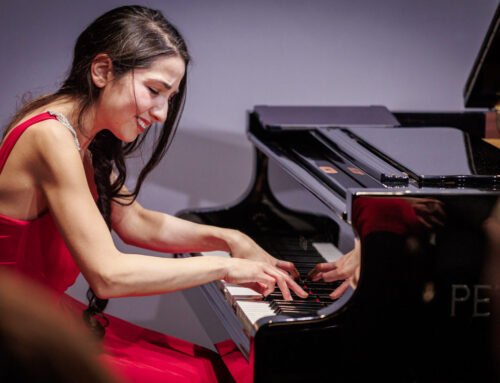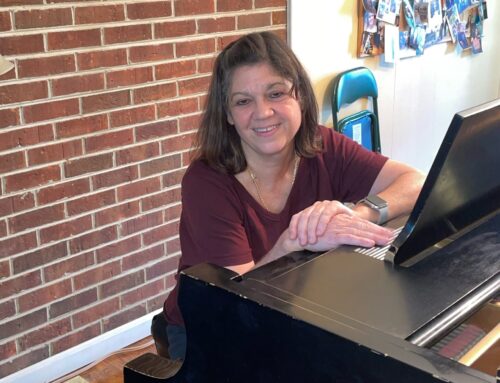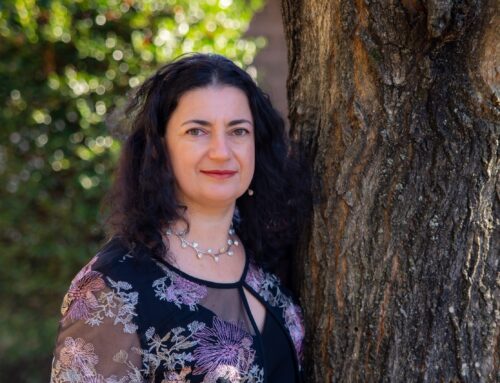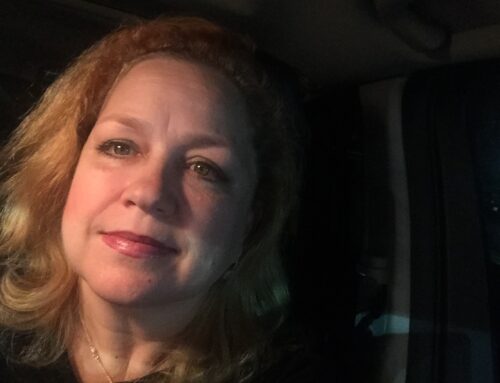Music Education
David Kosutic grew up in Arlington. He says, “I started piano rather late, and was very happy when I was in 8th grade and was able to transfer to Maryen Herrett for my piano studies. She was a president of VMTA and very active in this area. She had very high standards and was very tough. I grew so much from my time with her. When I joined her studio, I realized I had a lot of catching up to do. Her students were so amazing.
It was a joy to listen to everyone in the group classes. I had never heard the Mendelssohn Concerto or watched someone play Chopin 1st Concerto or Barber Sonata. Those pieces were revelations to my teenage mind. I decided if I worked super hard I could catch up. So I practiced a ton! She combined intensity with super high standards. She would not accept anything other than the very best! Maryen Hereto taught me what standards are about.”
Getting his Doctorate
I received three degrees, all from Indiana University. For my Doctorate, we had to play 8 recitals, write a paper, and do the written and orals exam, plus the infamous Styles Exam! I wrote my paper on Schumann’s Kreisleriana. Schumann was an editor and writer, and was fascinated by the literary developments of his time, notably the writings of E.T.A Hoffmann. He transplanted the literary techniques of Hoffmann into his Kreisleriana to make a musical narrative using his beloved Clara as his main character, and their forced separation at the time was the catalyst for his musical plot.
I loved my time there. There were so many amazing musicians – George Sebok (pianist – Nancy Breth studied with him) and Menahem Pressler. Intrinsic to becoming a musician is getting immersed in many different styles; I learned so much music by accompanying in so many wonderful studios: violinist Joseph Gingold, cellist Janos Starker, great singers like Margaret Harshaw, Virginia Zeani, Dale Moore.
Doctoral Teacher
My primary teacher was Luba Edlina who was married to Rostislav Dubinsky. Together they played in the Borodin Trio. Dubinsky was a founding member of the original Borodin Quartet – which played during Stalin’s time. They had a beautiful Old World approach to music and I gained a wonderful sense of musical style from both of them, plus they knew Shostakovich and premiered his pieces when they were in the USSR. So I really gleaned a lot from them on his style.
They defected – and Dubinsky’s book Stormy Applause describes their harrowing experiences as well as their incredible lives. It is available on rare book websites these days. He wrote it in English without having to translate! They were both amazing musicians and you can still hear their recordings (on Chandos label). Beethoven trios are amazing and of course all the Russian music.
Favorite Musical things
David listens to all kinds of music, from his favorite pianists and composers and pieces to different styles of jazz and even pop music. His favorite pianists include Martha Argerich, Evgeny Kissin, Murray Perahia, and he is always on the lookout for exciting new ones. He loves to listen to the Beethoven Quartets by Berg Quartet, and anything by Cecelia Bartoli, Rene Fleming, and Sylvia McNair. When he isn’t practicing or teaching, he loves to read, especially early American history. He is currently going through biographies of the presidents and is up to James Madison. He also enjoys walking and cooking and exercises whenever he can find time.
His lifetime goal is to play the entire Iberia by Albeniz (all 12 pieces–an hour and 40 minutes of music). He has performed just 3 pieces so far, but he read through the entire cycle this past summer. Some days he says he just dabbles on a few that pique his interest. Other days he actually practices pieces seriously. He says, “It is endlessly stimulating music – so full of life! A composer friend recently shared his new sonata with me, and I am stepping into new territory by playing brand new music, something I have not done much.”
When asked what David likes most about playing the piano, he said, “I love the tactile feeling of the fingers moving around the keys, and music is such a powerful drug, it really produces a feeling of exhilaration. I love the immersive quality! Playing a piece of music is like being immersed in an interactive movie.”
Involvement with NVMTA
Regarding NVMTA, David shares that he has literally learned how to teach by interacting with so many wonderful teachers and watching their masterclasses and students play. “Everyone has something to share which comes out of who they are as a musician and teacher. My growth as a teacher has spurred my growth as a musician and pianist. I feel like I know so much more now about technique and physicality at the piano now than when I started. I only wish I knew all of this earlier!”
He says, “I love the Concerto Festival/Competition! (There are competitions for grades K-3 and 4-12) Concertos are piano music on steroids! My kids enjoy learning them. They have such great style and panache! Kids grow from playing concertos because they tend to be longer and involve listening and ensemble playing. And the character is more extreme so they have to really express the style strongly. Also, Theory Mastery Day has always been a big event in my studio. Music is a language and we learn to speak it, understand it and read it and write it, just like any other language.
Advice to other teachers
David’s best advice to members of NVMTA is to talk with everyone. Don’t be shy! Ask questions, be open with where you are at as a teacher.
Here are some ways that David has participated in NVMTA:
- Attended in-person NVMTA meetings,
- Attended NVMTA zoom meetings (general meetings, TAT, or LATTE),
- Entered students in an NVMTA event,
- Entered a new NVMTA event this year,
- Entered students in an NVMTA competition,
- Participated on an NVMTA committee at any level,
- Given a presentation at an NVMTA meeting
David currently serves as a co-chair with Maiko Chiba of Theory Day, working with our chair, Narciso Solero. David was also Programs chair for a number of years. He enjoyed coming up with ideas and meeting so many interesting presenters. I have also held positions of Recording Secretary for Washington Music Teachers Assoc., and served as Chair of the WMTA Specialty Competition.
Career Highlights
Playing at Carnegie Hall and the Kennedy Center were highlights in my professional career, but my most vivid moments were my firsts: My first concerto performance with the Mount Vernon Chamber Orchestra under the wonderful Dingwall Fleary (sadly recently deceased) who was such a wonderful musician and also such a sensitive, kind man. My very first full-length solo recital at the Women’s Club when I was a 10th grader – as a student of Maryen Herrett. I was so excited!
Lessons learned
Looking back, I have learned many lessons. I now realize I needed to be more brave and try anything and not let fear of failure hold me back. Fear is a strong thing that can hamstring someone. Also, I really wish I would have understood better that my job is simply to be the best me – not necessarily to win everything-. It is not a failure if you lose, it is an opportunity to learn and improve. Who I am as a person is who I am as a pianist and teacher.
By accepting that, I can learn about myself and improve instead of just getting stuck in self-criticism because I am not like someone else. We all are unique with something special to share, but unfortunately that means we don’t always get what we think we want (like all first prizes etc.) . I am learning to accept who I am by accepting what it is I can contribute- a constant choice every day. It boils down to less judgment and more learning!
Interests
Currently, David lives in Falls Church with his partner Ken and their dog Presto. They have a smoker, two grills, and enjoy cooking. Food is like music – it is an adventure in a different culture! It is fun to try different spices and foods.

